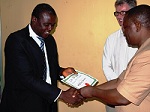October 2012
- Posting by PRAWA
- News

 The average time it takes for a criminal investigation to be completed by the Nigerian police is adjudged slow by all criminal justice stakeholders. There are existing evidences to show that the long time it takes the police to complete investigations and allow cases to move to next stage is one of the major causes of delay in the criminal justice process in Nigeria. The causes of these delays include near absence of capacity of the police to carry out effective investigations, both in terms of resources; and skills of investigating officers
The average time it takes for a criminal investigation to be completed by the Nigerian police is adjudged slow by all criminal justice stakeholders. There are existing evidences to show that the long time it takes the police to complete investigations and allow cases to move to next stage is one of the major causes of delay in the criminal justice process in Nigeria. The causes of these delays include near absence of capacity of the police to carry out effective investigations, both in terms of resources; and skills of investigating officers
Effective and efficient systems for managing and monitoring cases, to ensure that investigations proceed in timely and effective manner and are carried out in line with legal, policy and operational frameworks governing the work of the Nigerian Police Force are also inadequate. Very clear protocols and systems for communicating and co-operating with key stakeholders in the criminal investigation and prosecution process, including prosecutors, witnesses and experts such as medical practitioners and coroners are also lacking.
To address the above problems, The Justice for All J4A Programme of DFID in collaboration with PRAWA and the Justice Sector Reform Group of Enugu State are currently piloting a multi component intervention tagged “Speeding-Up Criminal Justice System in Enugu State Project” The intervention has identified root causes of delays in the criminal justice system and is now supporting the development and implementation of cross-sector solutions. One of these is speeding up effective police criminal investigations. The component of this intervention targeted at improving the capacity of the police to carry out investigations efficiently and effectively has started yielding. Over 43 officers from Criminal Investigation Department of the Force have successfully completed Investigative Interview Skill Enhancement Course at Enugu State Command Headquarters recently.
The training course covered a wide area and both in terms of technical skills, legal and rights issues relevant to the investigations process. This includes basic investigation skills, case building, acquisition and analysis of evidence and preparation of case files. The training will also focus on the legal and rights aspects of investigation work in relation to suspects and provided guidance on the investigation of crimes that require specific skills.
Other activities coming under this component include training, coaching, preparation of manuals and other guidance materials such as templates and checklists, assisting the Force to identify and analyze the gaps in resources that slow down investigations and identify means of filling those gaps. This might include working with the NPF on efficient allocation and management of existing resources, providing direct support and assisting the NPF to engage with other potential resource providers. Support the NPF to develop the fledgling case management system (CMS) so that it becomes an effective and valuable mechanism for tracking and managing the progress of cases both on an individual and overall basis, training and capacity development for managers to enhance their ability to effectively manage and oversee investigation processes and case work.
They also include supporting the police and other stakeholders to develop partnership arrangements that enable the NPF to complete investigations more efficiently whilst at the same time meet the needs of the other stakeholders. An example is agreed protocols and closer and earlier working with Ministry Of Justice prosecutors on cases where their involvement will be required. There will be a particular focus on encouraging all parties to see themselves as part of a team and to enhance communication systems.
Finally this intervention will support the NPF and other key actors to educate and sensitize the public on their role in helping investigations and encourage them to facilitate their speedy completion. This will enhance public support and improve understanding of citizens’ rights and responsibilities in relation to effective crime
